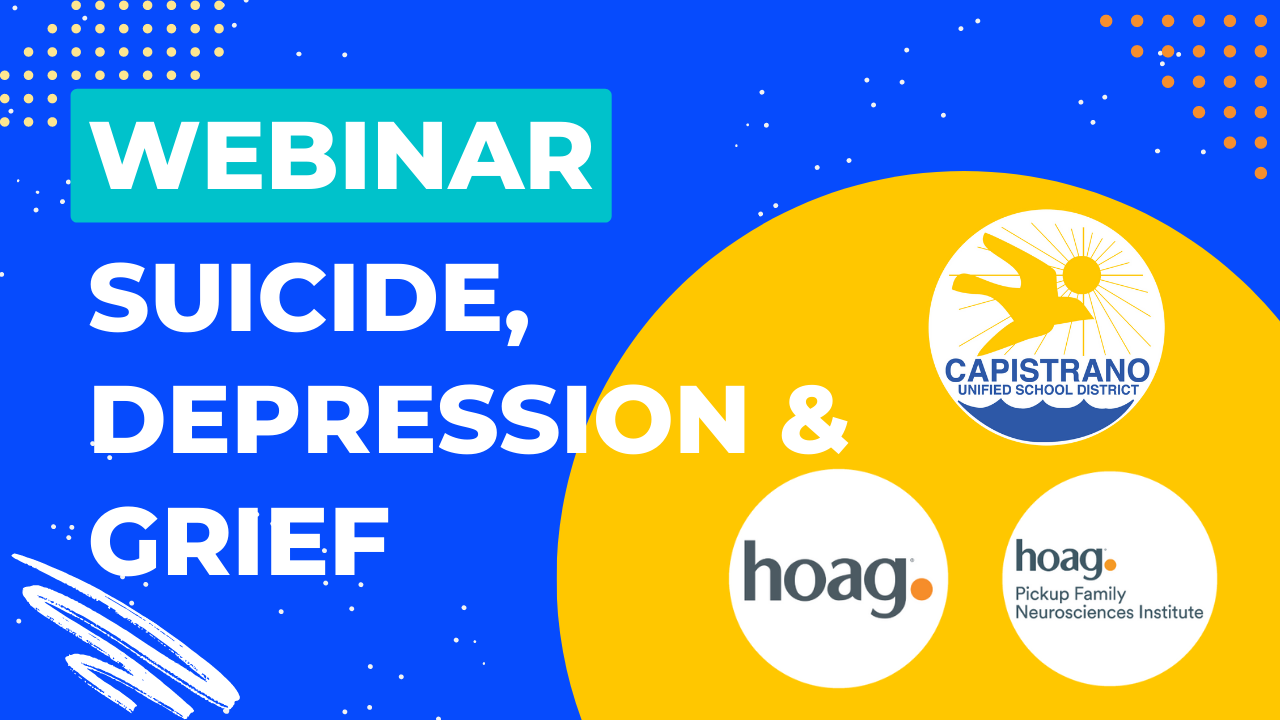The emotional toll on students’ daily lives can be overwhelming, and the situation was exacerbated during the pandemic. In order to help families deal with these difficult situations, CUSD has partnered with Hoag Hospital to offer free webinars on student mental health. The first this year dealt with depression, suicide and grief.
The ASPIRE Program at Hoag is an intensive outpatient program for adolescents, ages 13–17, with primary mental health disorders and possible co-occurring substance abuse challenges. Dr. Sina Safahieh and Dave Cook, LMFT, presented current information and statistics on child mental health issues, and offered ways for parents and students to combat them.
The suicide rate in Orange County (95/100,000) is the highest in all of California and one of the highest in the country. Additional statistics highlighted in the webinar include:
- 13% of adolescents reported suffering from at least one major depressive episode or primary health condition in the past year.
- 63% of these youth ages 12-17 did not receive any mental health treatment.
- 51% increase in hospital ER visits due to suicide attempt by adolescent girls over the past two years (U.S. Surgeon General).
- 60% increase in suicide rate for people ages 10-24 in 2018 comparted to 2000-07.
- Suicide is the second leading cause of death for college students (American Foundation of Suicide Prevention) and people ages 10-14 and 25-34 (CDC).
- 45% increase in the number of self-injury and suicide cases in children ages 5-17 compared to 2019.
- 25% increase in overall mental health-related emergency department visits for children ages 5-11 compared to 2019-20.
- 31% increase in overall mental health-related emergency department visits for children ages 12-17 compared to 2019-20.
The team shared information on what the ASPIRE Program offers and how families can utilize the services.
The full webinar can be viewed and shared through the link below.
Q&A
How does physical activity, being outside in the sun and non-sedentary activities benefit children?
A: Every able-bodied human being should engage in exercise and physical activity. It doesn’t matter what you do for exercise, as long as it is healthy and you are not going overboard, it is all beneficial. Living in California with such beautiful weather most of the year, we have every reason to be outside, moving our bodies as much as possible. Fresh air and sunlight exposure are excellent contributing factors to overall mental and physical health. Don’t feel like you have to make large changes right away. We’ll take approximate consistency over dramatic perfection every time, because it is more realistic and sustainable.
What do you say to empower parents who have children asking for phones and social media accounts?
A: Preparation ahead of times is key. If children are given screen time and access to devices at an early age, it can be really hard to take those away and limit use. If you can delay giving your child a smartphone as long as possible, even as late as 9th grade, that gives you more time to prepare ahead of time- setting limits and boundaries, set expectations and rules, etc. One good strategy is to treating having a phone as a privilege rather than a right. Parents can still be in control of how much media their children can access.
How can parents help their children deal with grief? Particularly after a traumatic event with a classmate or friend.
A: We encounter children often who are dealing with the loss of someone close to them, be it from suicide or natural causes. One thing we try to communicate with teens is that grief is not a linear process. There is no expected amount of time that you can expect to get over a traumatic event. One of the mistakes that we have encountered with parents is setting an expectation with the child that they should be over it in a set amount of time. Everyone, especially children, grieves differently. Some are expressive with their emotions, some hold things inside. It’s important to let them know it is OK to deal with grief as it comes and provide additional support as needed. Parents should remain vigilant in monitoring their child’s well-being following a traumatic event, stay engaged and ask for help if you feel it’s necessary.

